Heroes of The Suffering: Reggie Ogburn
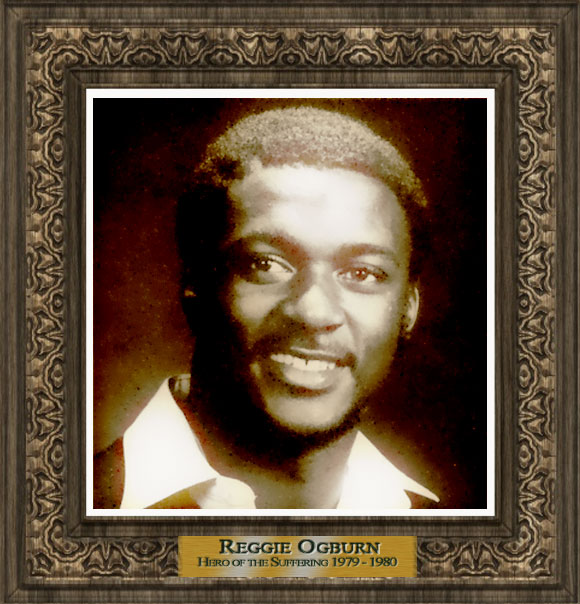
Oregon’s first great option quarterback. A Hero of the Suffering.
Before Jeremiah Masoli, before Akili Smith, Oregon had a junior college transfer who tore up the Pac-10 at quarterback.
Reginald Lorenzo Ogburn was 5’10”, weighed 190 dripping wet, ran a 4.5 40, and could frequently be seen on campus sporting a white turban held together with a silver-leaf pin. “It’s not religious or anything like that. It covers my head. It’s part of me ..
“It makes you stand out,” he’d say. “Well, I’m outstanding.”
He led the Ducks to back-to-back winning seasons, the only two in a span of 15 years. By now, his name is missing from most of the record lists, but he still holds the single-game record for rushing by an Oregon quarterback.
Born and raised in Miami, Florida, Ogburn was seemingly destined to become an option quarterback.
When I started playing football in the third grade, I was chubby and quick … I told them I wanted to be a fullback, but they made me a center. Then, when I was in the ninth grade, the coach asked me if I could throw the ball. I told him I wasn’t no Joe Namath, but I’d try.
That gave me a chance to run whenever I wanted to … Sometimes I’d rather just be a halfback.
Reggie played his junior college football in California. At College of the Canyons, he ranked #2 nationallly among juco players in total offense in 1977, with about 1500 passing yards and 1000 rushing. He played 4 games in ‘78 for CotC, but had a falling out with the coach, quit the team and hit the books to make the jump to a major college.
The infamous John Becker, Oregon’s offensive coordinator, brought him up from SoCal with promises that he’d be a starter. This wasn’t an empty promise. The Ducks were paper-thin at QB. The returning starter was Tim Durando, a converted free safety; the rest of the depth chart was comprised of Andrew Page and Mike Kennedy, both coming off injuries, and true freshman Kevin Lusk.
UCLA and Arizona wanted Reggie as well. But Ogburn had earlier signed a LOI with Cincinnati, and as Ogburn recalled, Cincy wouldn’t release the letter to Arizona; because the Wildcats coach, Tony Mason had bailed on Cincy a year earlier, and they didn’t want to do Mason any favors. (Tony Mason’s story: He said he’d met with Ogburn about coming to Arizona, but couldn’t promise him the starting job.) So, Arizona was out; Reggie’s grades weren’t good enough to get into UCLA, so, he came north.
It didn’t hurt that Rich Brooks was committed to an option attack. Durando had shown a lot of toughness and some running ability, but Ogburn was faster (4.5), quicker, and had a better arm. Ogburn grabbed the starting job coming out of spring practice in ’79.
[Ogburn] throws a tight spiral with the nose up, which makes it easier to catch.. He earned the number one spot with his performances during spring practice … carried the ball 11 times for 112 yards and two touchdowns, and passed for another 76 yards in the spring game.
— 1979 Oregon Media Guide
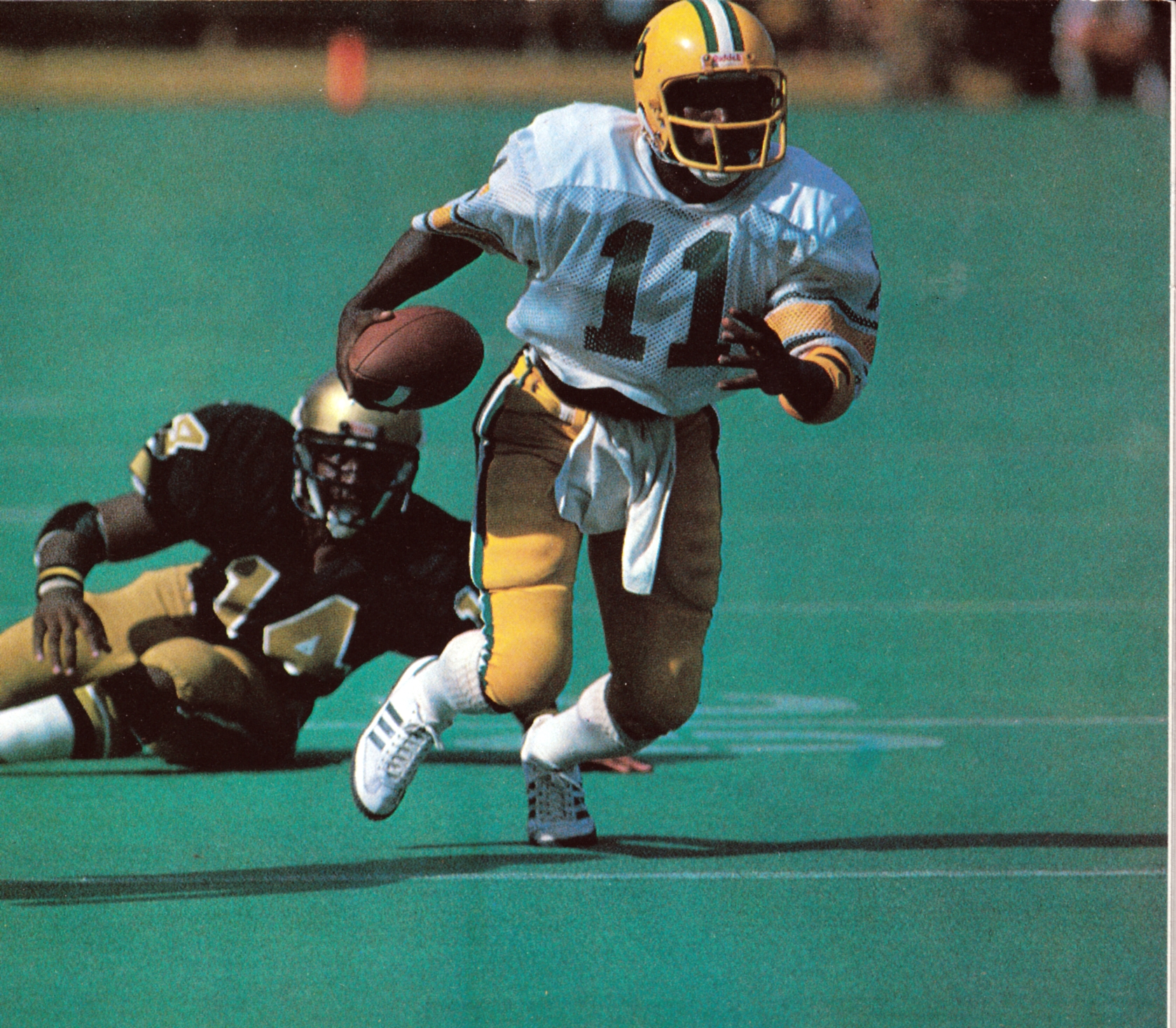 vs Colorado, 1979 (Oregon Media Guide)Reggie’s first start was memorable. Oregon went to Boulder to take on Colorado, which had just hired Chuck Fairbanks as head coach. Fairbanks had previously coached Oklahoma to back-to-back Big Eight championships and #2 national rankings (and eventual probation), and spent six years running the Patriots into the ground in the NFL, but to the Buff faithful he was seen as some kind of savior.
vs Colorado, 1979 (Oregon Media Guide)Reggie’s first start was memorable. Oregon went to Boulder to take on Colorado, which had just hired Chuck Fairbanks as head coach. Fairbanks had previously coached Oklahoma to back-to-back Big Eight championships and #2 national rankings (and eventual probation), and spent six years running the Patriots into the ground in the NFL, but to the Buff faithful he was seen as some kind of savior.
Ogburn ran onto Folsom Field and, with the help of nine sacks by the defense, tore Colorado to shreds.
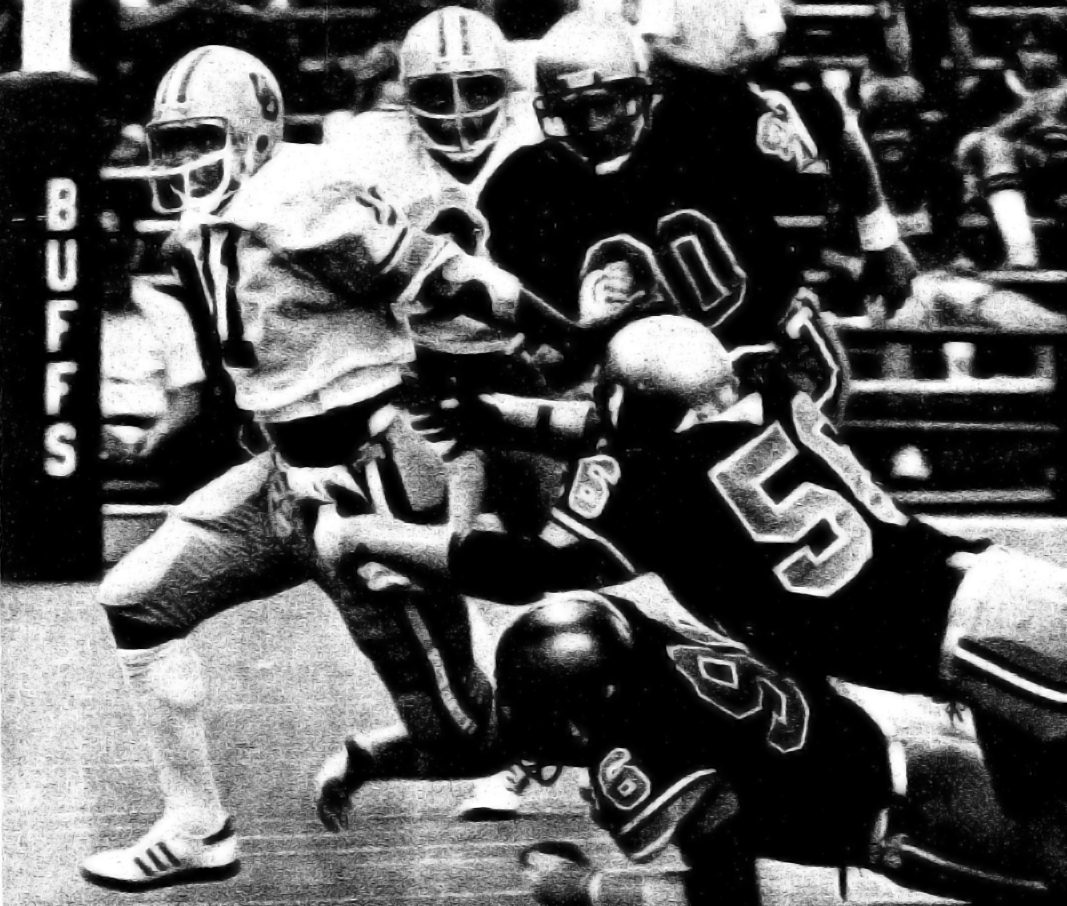 vs Colorado, 1979 (AP)He had 168 yards on 7-10 passing, including a 28 yard touchdown pass to TE Rick Ward, and 108 yards rushing on 17 carries. The Ducks — 13 point underdogs — won, 33-19.
vs Colorado, 1979 (AP)He had 168 yards on 7-10 passing, including a 28 yard touchdown pass to TE Rick Ward, and 108 yards rushing on 17 carries. The Ducks — 13 point underdogs — won, 33-19.
After the game, in an attempt to explain his team’s defeat, the losing coach uttered a statement that nobody could remember hearing in any recent positive context …
I don’t think Oregon is a great football team.
— Colorado coach Chuck Fairbanks
Great? No, but they looked good, much better than expected. Maybe things really were changing.
There were ups and downs in ‘79 — the early schedule was brutal; a 41-17 road loss to #8 Michigan State, then a 4th-quarter collapse at Autzen against the Huskies, where Ogburn tweaked his knee, then another trip to the Big 10 and a close loss at Purdue, where he didn’t start and was ineffective.
But they righted the ship with a 19-14 win over Cal at Autzen. It was the first time Oregon had beaten any of the four California schools since 1972, and the victory was engineered by Ogburn, who had 100 yards rushing and 100 passing, including a 60 yard bomb to Don Coleman for the go-ahead touchdown. Ogburn was named Pac-10 Player of the Week for his effort.
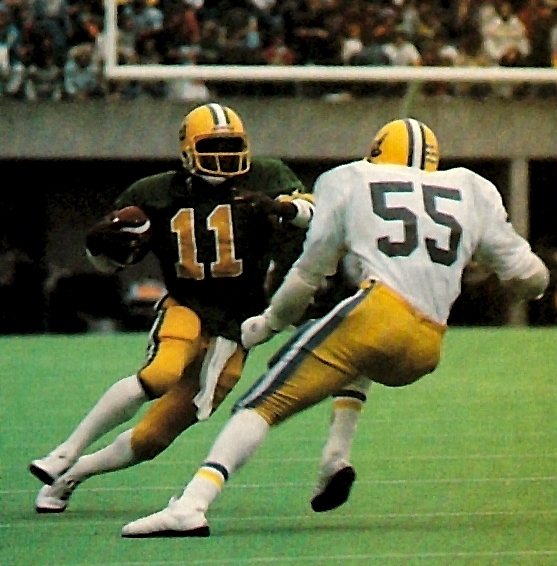
That little guy Ogburn sure made it tough.
— Cal head coach Roger Theder
By late October Len Casanova was calling Reggie the best option quarterback he’d ever seen at Oregon.
It wasn’t all glory. In a lethargic win on a cold and wet day at home against Air Force, Ogburn discovered that playing in the Northwest wasn’t like playing in Miami or SoCal. He didn’t warm up adequately, and played miserably, and was replaced twice by a frustrated Brooks. But they won. And Ogburn made up for it a week later, with his best game since Colorado in a 37-24 win at Pullman.
By mid-November, after beating Stanford to get to 5-4, people in Eugene were even saying the B word. Rumors were rampant that the Ducks were in contention for a bid in the new Garden State Bowl, to be played in Giants Stadium in New Jersey. In 1979, even a rumor about a bowl in New Jersey could get the fans worked up. Two games left: a weak UCLA squad with just four wins, and the Civil War. 7-4 was within reach.
Problem: The defense that Brooks had relied on to keep his team in games was being wiped out by injuries. The front four to start the season — Terry Dion, Neil Elshire, Scott Setterlund and Vince Goldsmith — was as good as any in the Pac-10, and better than most; and MLB Bryan Hinkle would eventually go on to a decent career with the Steelers. But by the UCLA game, Elshire, Setterlund and Hnkle were all out for the season.
UCLA came to Autzen and, in front of a crowd of over 41,000 one of the most miserable afternoons for football in Autzen memory (40 degrees, wind and rain), ran over the Ducks, 35-0. Literally, ran over them — 91 times; Oregon’s injury-riddled defensive front gave up 446 yards on the ground. By the end of the game Brooks was playing first-year offensive linemen on the defensive front. The tone had been set in the first series, when Ogburn fumbled a snap on the UCLA 44. He didn’t even finish the first half; Reggie had just 31 yards of offense to his credit along with the fumble.
Ogburn was chagrined, and philosophical, after the game:
Sometimes you get a tendency to talk about what you want to accomplish, and you forget what you’ve got to do to accomplish it.
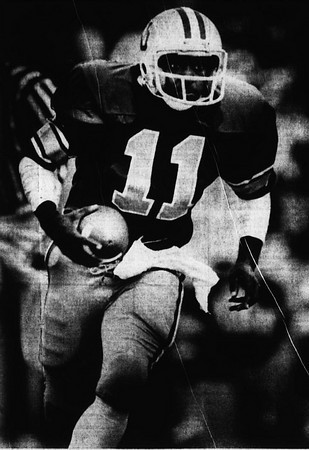 vs OSU, 1979 (AP Photo)6-5 wouldn’t get Oregon into a bowl game back then — the Garden Staters took 6-5 Cal instead — but Ogburn and the Ducks ground down the Beavs 24-3 to secure the first winning record in nine years.
vs OSU, 1979 (AP Photo)6-5 wouldn’t get Oregon into a bowl game back then — the Garden Staters took 6-5 Cal instead — but Ogburn and the Ducks ground down the Beavs 24-3 to secure the first winning record in nine years.
Rich Brooks gave Ogburn much of the credit for the progress his team had made:
He had a great impact, all right … When the guys looked out and saw Reggie, they knew he had the talent and ability to overcome a mistake. They knew we could get back in games, and score.
Ogburn’s 644 rushing yards set a single-season record for Oregon quarterbacks. His 1549 yards of total offense ranked fifth in school history; only Dan Fouts and Bob Berry had been more prolific.
***
For 1980, things were looking great. Lots of talent was coming back — Oregon would return 18 of 22 starters from ‘79 — and recruiting was going well. For a few weeks, anyway. Then, everything fell apart in the space of a few months. The grade scandal, and the theft scandals, and all the other scandals hit. Becker resigned before he could be fired; Brooks offered to resign but the school wouldn’t let him. The Ducks went on probation. They could be as good as they wanted, but there would be no bowl game to dream about.
Ogburn was declared ineligible for the 1980 season by the NCAA in late summer. Oregon appealed, citing mitigating circumstances, and the NCAA relented. But he still had to sit out the first game in ’80 along with several other players for receiving illegal benefits (airline tickets not offered to non-athlete students). The suspension was seen by some as unfair — specifically, by the coaches of the teams that would *not* get to face Oregon without Ogburn:
They should have put all the eligible school’s names in a hat and drawn one out. That would be the school that didn’t have to play Oregon with Reggie Ogburn at quarterback. Why should Stanford get the break? Why not the poor old Cougars?
— WSU head coach Jim Walden
It isn’t fair … We aren’t playing the same schedule.
— Cal QB Rich Campbell
The irony was that game 1 of 1980 was originally scheduled to be against Kansas, but Oregon AD John Caine convinced the Stanford AD that the game had a better chance of being televised, and would have a better gate, in early September than late November. So, the game was moved.
Somewhat demoralized, Oregon came out flat, fell behind 21-0 in the first quarter and eventually lost to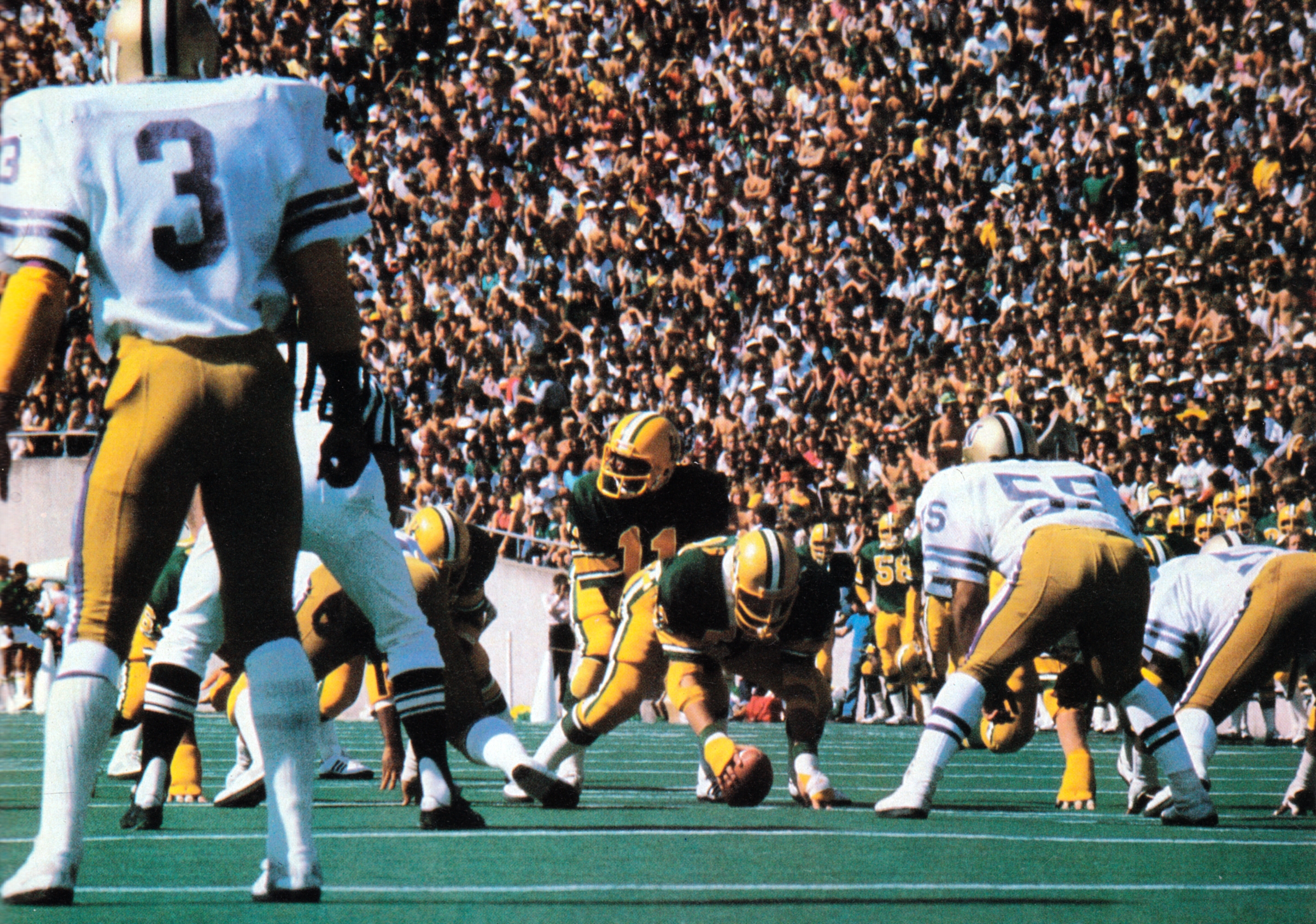 vs Washington, 1979 John Elway and Darrin Nelson, 35-25; Kevin Lusk reminded nobody of Reggie Ogburn. The next week, they tied Kansas 7-7, then got revenge for the previous loss at East Lansing by blowing out Michigan State 35-7 at home; it was the first Duck win over a Big Ten team since 1964 (Indiana).
vs Washington, 1979 John Elway and Darrin Nelson, 35-25; Kevin Lusk reminded nobody of Reggie Ogburn. The next week, they tied Kansas 7-7, then got revenge for the previous loss at East Lansing by blowing out Michigan State 35-7 at home; it was the first Duck win over a Big Ten team since 1964 (Indiana).
Game four of 1980 was in Seattle. The home fans had expected another blowout, and they got one — but not the one they’d assumed. Oregon controlled the game from the 2nd quarter on; Ogburn scored twice in the 2nd half, after two masterful option drives, and Steve Brown picked off a pass and went the distance. 34-10. Brooks called it his most memorable win for years afterwards.
Ups and downs continued. Ogburn was injured early at Cal, and they lost. Still hurt, he was back at home against #2 USC, splitting the snaps with Lusk, and they tied the Trojans, 7-7. Ogburn had been throwing at the USC end zone in the game’s last possession, but he went to the wrong side of the field, into coverage, and saw his last pass tipped and picked as Vince Williams ran unopposed down the opposite sideline.
Oregon won four of its last five to finish the season, including a big revenge win at UCLA — their third win over a ranked team, the first conquest of a top 10 team since Air Force in 1970, and the first win in LA since ‘71. And, in what had become the annual ritual destruction of the Beavers, Ogburn tore up the turf at Parker Stadium, setting the school record for a QB of 173 yards on 14 carries, including a 59-yard touchdown the first time he called his own number. A season-ending loss to ASU was a bummer, but Reggie almost pulled off a huge comeback in his last game, with three 4th quarter TDs in a 42-37 loss.
Even on probation, 6-3-2 seemed like a great season. And Ogburn was the catalyst; without him, it’s unlikely they would have seen four wins with all the injuries and chaos that season.
***
Reggie shared team MVP honors with Vince Goldsmith in 1980. His on-field performance made a strong case for his consideration as the Pac-10 MVP, and for selection on at least one post-season All-Star team. But no further honors were forthcoming. The stench of probation could have influenced the voters.
He didn’t get drafted. Too short to be a NFL QB, they said. Nobody runs option in the NFL, they said. He played in the CFL for a year, then signed as a free-agent before the ‘81 fall camp with the Raiders as a running back. He didn’t make it. He spent time with the Oregon City Steelheaders in 1982, where he doubled as quarterback and offensive coordinator. He was offered a contract with the Boston Breakers of the USFL in late 1982, sight unseen; he didn’t make the team. He eventually returned to Miami, and at last report (1998) was married with a daughter and working a manager in the shipping industry.
The winning seasons soon disappeared into the depths of the Suffering, but for a couple of years, Reggie Ogburn gave Oregon fans reason to think things could be better.
***
Reggie Ogburn: By The Numbers
 benzduck |
benzduck |  2 Comments |
2 Comments | 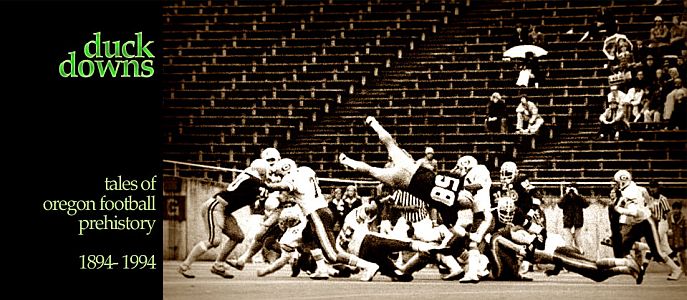
Reader Comments (2)